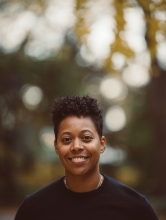Parker Foster
What issues do Black girls face in educational spaces?
U.S. social systems, plagued by very specific infirmities, shape Black girls’ experiences and contribute to their neglect, erasure, and oppression. These systems create uniquely racialized and gendered encounters. Recently, these encounters placed Black girls at the nexus of three simultaneous pandemics: COVID-19, sexism, and white supremacy. Each of these continues to wreak havoc on Black girls within and across U.S. social systems. This piece emphasizes the critical need to examine, research, and report on Black girls’ experiences, including the policies, practices, and personnel of their schools and neighborhoods. Furthermore, it highlights the implications that youth-centered and participatory research could have on improving various experiences of Black girls.
Black girls are too often invisibilized in conversations and studies about school discipline reform and juvenile justice that center their focus on Black boys. Despite being invisibilized, Black girls comprise the fastest growing portion of the juvenile justice system, as only 14% of the general population, but 33% of detained and committed girls. Black girls are 6 times more likely than white girls to be suspended from school, often due to ambiguous and subjective reasons such as “insubordination.” A prevailing belief that Black girls are overly assertive, with a need to be quieted dominates many educational spaces. Their methods of self-expression are not celebrated and are often punished. This belief extends beyond the walls of the school building, as evidenced by the four Tennessean Black girls who were recently arrested in school and incarcerated for allegedly committing crimes that did not exist.
How do Black girls operate in spaces that seek to oppress them?
COVID-19 has only compounded the structural racism and sexism Black girls already faced. During the 2020-21 school year, over half of the nation’s students lived in districts where remote learning was the primary method of schooling; however, more than 60% of students of color lived in those districts, with higher percentages of Black and Latinx students having limited or no internet access.
Despite this system of racist structures, practices, and beliefs, Black girls not only survive hostile conditions but also thrive. Black girls are agentic and draw on numerous, varied resources that go unacknowledged by the systems that victimize and attempt to destroy them. For example, when Black girls engage in classroom lessons and discussions, they may be dismissed or shut down by their teachers because their engagement is not compliant with classroom rules or preconceived notions of how young ladies should act, as noted in a case study. Their education is inextricably linked to their agency and the creation of spaces that protect and cultivate their agency can lead to their liberation. For example, research suggests that when students are intentionally engaged, their academic engagement, test scores, and pride in identity increase.
What can youth-centered research do?
Research centering Black girls can reframe the narrative on their education, inform practices and policies in urban school districts, and advance theoretical understanding of Black girls. Further research could provide better understanding of how Black girls’ identities contribute to the communal resources that they employ as they navigate social institutions.
Instead of dismissing Black girls’ approaches to solving issues and engaging in educational spaces, adults should call upon the unique expertise that these girls possess. Exploring Black girls’ methods of expression involves centering their voices to understand the meaning-making methods they employ to make sense of the world around them. For stakeholders who are invested in bettering the world for Black girls, this means utilizing research methods that are inclusive and participatory. Storytelling is a qualitative research method that allows Black girls to reframe their narratives through their lens, not a lens that is given to them. It allows them to channel lesbian feminist scholar Audre Lorde and define themselves for themselves.
Furthermore, critically inquiring about the source of the disparities they face would influence the practices and policies that impact their everyday experiences. It isn’t enough to simply identify the disparities that they face, but as researchers, we must interrogate why these disparities persist and the solutions needed to dismantle the systems that perpetuate the inequities that Black girls consistently encounter.
To continue this conversation, the Center for Policy, Research, and Evaluation will be hosting a virtual community forum on February 16 discussing the various intersecting identities of Black girls and their educational experiences. We welcome you to register for A Community Conversation with Black Girls: Identity, Education, and Girlhood.


